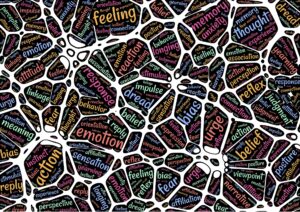
Image by John Hain from Pixabay
Maintaining Balance in an Unpredictable World
Life is full of ups and downs, pleasure and pain, joy and frustration. Most of us pursue the good feelings and good times and run from the opposite. We do everything in our power to avoid pain and suffering. Sometimes our actions provide short-term relief. Other times we find ourselves back at the same old sand pit. What’s going on? Let’s look at neuroscience to see how the brain can help us maintain balance in an unpredictable world.
According to information in Buddha’s Brain – The Practical Neuroscience of Happiness, Love & Wisdom by Rick Hanson, Ph.D., the brain is hard wired to cling to negative experiences and is drawn to bad news. As a result, the brain over looks good news, highlights bad news and creates anxiety and pessimism. Without intervention, without cultivating awareness, running from the discomforts that are part of everyday life is futile. We say we want to experience more freedom, joy and happiness in our lives, but most of us don’t know how to create it. Our brain’s wiring makes it worse. Instead of helping us be all we can be, our brain clings to limiting beliefs that keep us stuck in the past.
The Brain
The brain is wired for safety and security and the avoidance of risk-taking. This started when survival depended on outrunning tigers. To help us survive the brain tries to find and maintain fixed patterns that occur in an ever-changing world. As a result, the brain wants to maintain the status quo–what it knows and understands. That’s why the good feelings associated with a new job or a raise, an opportunity to collaborate with someone we hold in high regard, or the publication of a book doesn’t last long. This is also why we keep experiencing the same bad relationships.
Think about the last time something wonderful happened to you. An engagement or marriage, the birth of a baby, buying a new home, or a promotion. Recall how happy and excited you were. Now, recall how long those good feelings lasted or to be more accurate, how quickly it took for those good feelings to fade. Just because the brain is wired to return to a less than joyful state, doesn’t mean you have to go there.
Hanson’s Research
Hanson’s research on the brain provides an array of options for reaching happier state of mind instead of feeling driven, rattled, stressed, irritated, anxious or blue. These include relaxation, diaphragm breathing, progressive relaxation, big exhalation, touching the lips, yoga, imagery, balancing your heartbeat and meditation.
To feel safer and “control the hardwired tendency to look for and overreact to threats,” in addition to relaxation and imagery, Hanson recommends connecting with people who support you, bringing mindfulness to fear, evoking inner protectors, and being realistic–generally nothing is as bad as we imagine. His final recommendation is finding refuge– “anyone or anything that provides reliable sanctuary and protection so you can let down your guard and gather strength and wisdom.”
Finding Refuge
Many people find refuge in nature. Camping, hiking, walking outdoors is a great way to recharge. As often as possible I take my golden retriever for a walk along a woodsy canal near my home. No matter what problems I’m experiencing or troubling thoughts I’m carrying with me, a walk in nature always helps. Writing is also a source of refuge for me. I spend the first 15-30 minutes of each morning writing in a journal–recording dreams, setting my intention for the day, unloading thoughts and ideas. When the pandemic first began and we were required to stay at home, writing helped me remain calm and weather the unknown storm.
Exercise, relaxation, and meditation are also sources of refuge for me. Currently, I’m following ab, arm, and leg routines by Sarah Rector on DailyOM. If you’re not familiar with DailyOM check it out. They offer a variety of life-changing courses like Chair Yoga for Healing and 4 Min Metabolism Booster–at pay what you can prices. For guided meditation, I go to InsightTimer. Otherwise, after exercise I sit on my mat and follow my breath for a minimum of 5 minutes, sometimes more.
In an unpredictable world, the brain can be a powerful ally. You simply need to understand how to use it to maintain balance and enjoy life more.
# # #
Jan Fishler is the author of Searching for Jane, Finding Myself (an adoption memoir), Don’t Stop Now: Making the Most of the Rest of Your Life, Flex Your Writing Muscle (365 Writing Prompts), and PTSD: Lessons From Vietnam. She is a motivational speaker who also teaches writing classes online. More about Jan at www.JanFishler.net

Leave a Reply
You must be logged in to post a comment.